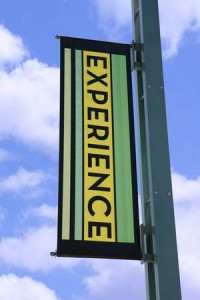No Experience? Not Necessarily Thanks to Academic Projects

In my role, I counsel students who may be looking for their first professional experience. Typically, students will be looking at internship opportunities to assist them with clarifying career goals, getting insight on working for a particular organization or to gain experience.
Students sometimes worry about how to get experience if they don’t necessarily have relevant work experience. It can feel confusing and makes one remember the proverbial question, “Which came first the chicken or the egg?”
Luckily, students have some built-in experience gained from their education that they can highlight on a resume for employers.
What are employers looking for?
When looking for interns, employers seek information that helps them understand how a candidate’s background makes them a good fit.
Something to remember is that an employer may be looking to hire you based on many factors for an internship. They may be looking for some relevant classes, computer skills or transferable skills, such as the ability to communicate well or teamwork experience. Look to the internship description or that organization’s website for clues on what the internship dictates in terms of experience.
When presenting yourself to employers, it is important that you put your best foot forward. Especially for intern candidates, your best selling point may be your education. Listing your degree and some relevant classes is a great first step, but you can take that further by adding academic projects that are relevant to an employer’s needs.
How to make an academic project work on your resume
Your academic, or class, projects allow you to show employers how your education translates to the work world.
I think that this statement surprises many students because they may think things like: “This was just a small project” or “Can I really put things like that on my resume?”
The idea of adding projects to your resume can seem pretty simple, yet it can feel overwhelming to put a semester’s worth of work into a few lines on paper.
The following are the four major aspects I look for in academic projects on a resume:
1. Role
What role did you play for this project? Were you a member of a team? Did you lead the team? Did you serve a particular function for this team? Was this individual?
Conveying the role you played on a team is helpful to show employers your ability to lead or work within a team. As an intern, much of the work you may be doing could be team based, so this is a skill to highlight.
2. Purpose
Was the purpose of your class project to research something, analyze a sector of business, create or develop a tool, or something else?
By outlining the purpose of the project you are able to succinctly introduce a topic or problem that you solved that is relevant to a particular field.
3. Method
Showcasing the types of skills you used to complete your project is a great way to give a context for your experience level with a particular skill. In addition, you can infuse key action words into your resume through the tasks that you did on a project.
Perhaps you:
- Researched consumer trends by surveying a sampling of consumers
- Created a design using AutoCAD
- Implemented an intervention for first-generation college students incorporating tenets of Holland’s Theory of Career Choice
The “method” helps you introduce skills onto your resume even if you are not an expert at them.
4. Outcome
Oftentimes students do a great job of highlighting what the purpose of a project was and how they achieved it (the method) but tend to forget to speak about their achievements.
Instead of telling the employer the grade you got, you can outline the fact that you:
- Presented your findings to an organization or committee
- Facilitated an interactive demonstration to a class of 20 of your peers and faculty
- Achieved your goal and stayed within budget
Add transferable and relevant skills to your resume by letting employers see how you were able to take a project to completion.
Putting an ‘Academic Project’ together:
Once you can put these four keys together, you can add an “Academic Projects” or “Class projects” section to your resume that will allow employers to see how your education is valuable to your candidacy. Consider listing two or three such projects. Here’s an example:
Market Research Project, Spring 2010
- Led a team of 4 in the creation of a multi-phased ad campaign designed to increase sales for Company ABC
- Developed a strategic plan based on SWOT analysis, market research, pricing, promotional and sales strategies
- Generated a social media-based marketing plan and presented ad campaign to a class of 30 peers
In the example, the academic project allows the candidate to leverage the skills that they built in a marketing class. They are able to showcase leadership skills and team work skills while also giving the employer a context for the size of group that they worked with.
Additionally, they are able to show how they have gained skills related to their ability to analyze market trends and develop a social media-based marketing plan.
Finally, they are able to showcase some more communication skills by highlighting the class presentation including the size of the group that was presented to.
Give it a shot, and see what you can put together. And remember – the next time you think you have no experience, that may not necessarily be true.
[This post was originally written for the Student Branding Blog.]